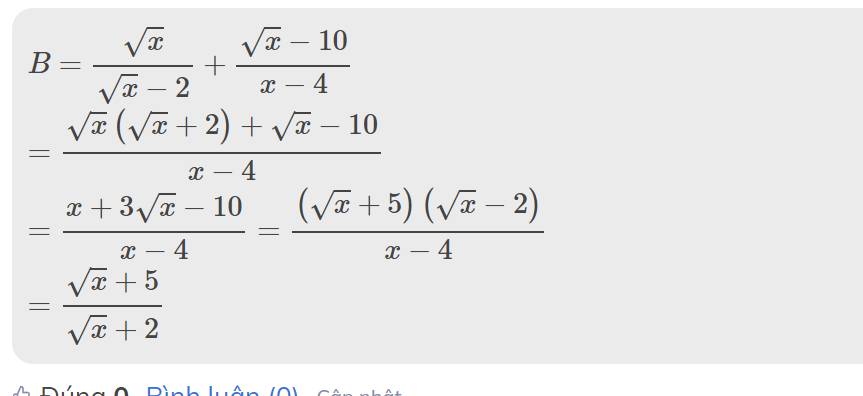TÌm số thực x không âm để C= 9+2$\sqrt{x}$/2+3$\sqrt{x}$ có giá trị nguyên
Hãy nhập câu hỏi của bạn vào đây, nếu là tài khoản VIP, bạn sẽ được ưu tiên trả lời.


\(C=\dfrac{9+2\sqrt{x}}{2+3\sqrt{x}}\Rightarrow2C+3C\sqrt{x}=9+2\sqrt{x}\)
\(\Rightarrow\sqrt{x}\left(3C-2\right)=9-2C\)
\(\Rightarrow\sqrt{x}=\dfrac{9-2C}{3C-2}\ge0\Rightarrow\dfrac{2}{3}< C\le\dfrac{9}{2}\)
Mà C nguyên \(\Rightarrow C=\left\{1;2;3;4\right\}\)
- Với \(C=1\Rightarrow\sqrt{x}=\dfrac{9-2C}{3C-2}=7\Rightarrow x=49\)
- Với \(C=2\Rightarrow\sqrt{x}=\dfrac{9-2.2}{3.2-2}=\dfrac{5}{4}\Rightarrow x=\dfrac{25}{16}\)
... tương tự
C=9+2√x2+3√x⇒2C+3C√x=9+2√x
⇒√x(3C−2)=9−2C
⇒√x=9−2C3C−2≥0⇒23<C≤92
Mà C nguyên ⇒C={1;2;3;4}
- Với C=1⇒√x=9−2C3C−2=7⇒x=49
- Với C=2⇒√x=9−2.23.2−2=54⇒x=2516

Bài 8:
\(M=1+\frac{4}{\sqrt{x}+1}\)
Để $M$ nguyên thì $\frac{4}{\sqrt{x}+1}$ nguyên
Đặt $\frac{4}{\sqrt{x}+1}=t$ với $t$ là số nguyên dương
$\Rightarrow \sqrt{x}+1=\frac{4}{t}$
$\sqrt{x}=\frac{4}{t}-1=\frac{4-t}{t}\geq 0$
$\Rightarrow 4-t\geq 0\Rightarrow t\leq 4$
Mà $t$ nguyên dương suy ra $t=1;2;3;4$
Kéo theo $x=9; 1; \frac{1}{9}; 0$
Kết hợp đkxđ nên $x=0; \frac{1}{9};9$
Bài 9:
$P=1+\frac{5}{\sqrt{x}+2}$
Để $P$ nguyên thì $\frac{5}{\sqrt{x}+2}$ nguyên
Đặt $\frac{5}{\sqrt{x}+2}=t$ với $t\in\mathbb{Z}^+$
$\Leftrightarrow \sqrt{x}+2=\frac{5}{t}$
$\Leftrightarrow \sqrt{x}=\frac{5-2t}{t}\geq 0$
Với $t>0\Rightarrow 5-2t\geq 0$
$\Leftrightarrow t\leq \frac{5}{2}$
Vì $t$ nguyên dương suy ra $t=1;2$
$\Rightarrow x=9; \frac{1}{4}$ (thỏa đkxđ)

a: Khi x=9 thì \(A=\dfrac{17}{3+2}=\dfrac{17}{5}\)
b: 
c: P=A:B
\(=\dfrac{17}{\sqrt{x}+2}:\dfrac{\sqrt{x}+5}{\sqrt{x}+2}=\dfrac{17}{\sqrt{x}+5}\)
Để P là số nguyên thì \(17⋮\sqrt{x}+5\)
mà \(\sqrt{x}+5>=5\) với mọi x thỏa mãn ĐKXĐ
nên \(\sqrt{x}+5=17\)
=>x=144

Lời giải:
ĐK: $x\geq 0; x\neq 4; x\neq 9$
a)
\(P=\frac{2\sqrt{x}-9}{(\sqrt{x}-3)(\sqrt{x}-2)}+\frac{(2\sqrt{x}+1)(\sqrt{x}-2)}{(\sqrt{x}-3)(\sqrt{x}-2)}-\frac{(\sqrt{x}+3)(\sqrt{x}-3)}{(\sqrt{x}-3)(\sqrt{x}-2)}\)
\(=\frac{2\sqrt{x}-9+(2\sqrt{x}+1)(\sqrt{x}-2)-(\sqrt{x}+3)(\sqrt{x}-3)}{(\sqrt{x}-3)(\sqrt{x}-2)}=\frac{x-\sqrt{x}-2}{(\sqrt{x}-3)(\sqrt{x}-2)}\)
\(=\frac{(\sqrt{x}-2)(\sqrt{x}+1)}{(\sqrt{x}-3)(\sqrt{x}-2)}=\frac{\sqrt{x}+1}{\sqrt{x}-3}\)
b) \(P=\frac{\sqrt{x}+1}{\sqrt{x}-3}=1+\frac{4}{\sqrt{x}-3}\)
Với $x$ nguyên, để $P$ nguyên thì $\sqrt{x}-3$ phải là ước nguyên của $4$
Mà $\sqrt{x}-3\geq -3$ nên:
$\Rightarrow \sqrt{x}-3\in\left\{\pm 1;\pm 2;4\right\}$
$\Rightarrow x\in \left\{4;16;1;25;49\right\}$ (đều thỏa mãn.

a) ĐKXĐ : \(\hept{\begin{cases}x\ge0\\x\ne1\\x\ne9\end{cases}}\)
b) \(P=\left(\frac{2\sqrt{x}}{\sqrt{x}+3}+\frac{\sqrt{x}}{\sqrt{x}-3}-\frac{3x-3}{x-9}\right):\left(\frac{2\sqrt{x}-2}{\sqrt{x}+3}\right)\)
\(=\frac{2\sqrt{x}\left(\sqrt{x}-3\right)+\sqrt{x}\left(\sqrt{x}+3\right)-3x+3}{\left(\sqrt{x}+3\right)\left(\sqrt{x}-3\right)}.\frac{\sqrt{x}+3}{2\left(\sqrt{x}-1\right)}=\frac{-3\left(\sqrt{x}-1\right)}{2\left(\sqrt{x}-3\right)\left(\sqrt{x}-1\right)}=-\frac{3}{2\left(\sqrt{x}-3\right)}\)c) Để P nguyên thì \(2\left(\sqrt{x}-3\right)\in\left\{-3;-1;1;3\right\}\)=> x thuộc rỗng.